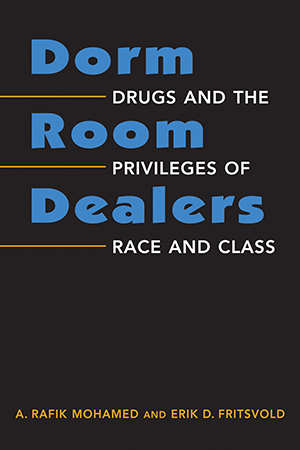A. Rafik Mohamed and Erik D. Fritsvold
Why do affluent, upwardly mobile college students—who have everything to lose and little to gain—choose to sell drugs? Why do law enforcement officers largely overlook drug dealing on college campuses?
With rich, lively details, A. Rafik Mohamed and Erik Fritsvold deliver unprecedented insight into the world of college drug dealers—and offer an important corrective to the traditional distorted view of the US drug trade as primarily involving poor minorities. Drawing on six years of fieldwork at a predominately white private university, their exceptional ethnography skillfully explores issues of deviance, race, and stratification in the US war on drugs.
A. Rafik Mohamed is professor of sociology and dean of social and behavioral sciences at California State University, San Bernardino.
Erik D. Fritsvold is assistant professor of sociology at the University of San Diego.
Also of interest:
The High Life: Club Kids, Harm and Drug Policy by Dina Perrone
"This fascinating book shows how discriminatory enforcement continues to structure efforts to reduce the US drug problem."—Alex Stevens, Drugs
"A vivid account of a frequently overlooked area of the drug trade that in many ways defies both the stereotypes and widely accepted criminological truths regarding drug dealers.... This exceptional ethnography provides an insightful and fresh perspective on the power of race and class in our society."—Vikas Kumar Gumbhir, Criminal Justice Review
"The authors effectively challenge many of the racial assumptions about America's drug war by focusing on the middle- and upper-class dealers who operate 'in plain sight' of anti-drug laws in spaces of privilege."—Joseph O. Jewell, Ethnic and Racial Studies
"Provocative.... A serious and important book that should be read by students and scholars in criminology and related social science disciplines, as well as by parents of college students, university administrators, and law- and policy makers."—Avi Brisman, Race and Justice
"A fascinating and highly readable investigation.... Filled with insights about the white, middle-class drug trade and the many factors that make white, middle-class youth 'anti-targets' in the war on drugs."—Algernon Austin, BlackCommentator.com
"An exciting book.... Provides readers with a rare view of the largely 'invisible' drug trade involving wealthy student clientele.... We need more books like this to provide a more rounded view of the drug problem and the selective enforcement that has left—and continues to leave—poor racial and ethnic minorities bearing the brunt of the incarceration binge related to the 'war on drugs.' This book should be read widely in criminology and related social science disciplines by both students and scholars of racial/ethnic inequities in the administration of criminal justice, as well as those who blindly and naively rely on crime statistics."—Shaun L. Gabbidon, Crime, Media, Culture
"Dorm Room Dealers is a valuable contribution to the ethnography of drug use and drug selling and is an interesting read, too."—Phillip S. Smith, Drug War Chronicle
"Outstanding…. The authors uncover a world of drug dealing far removed from violent street-corner slinging and as entwined in the college experience as all-nighters and keg parties. Providing unparalleled insight into the war on drugs and an all-but-ignored deviant world, this book is as entertaining to read as it is educational."—Peter Moskos, John Jay College of Criminal Justice
"An excellent study that finally puts the race/class-biased War on Drugs into perspective."—William J. Chambliss, George Washington University
"Compellingly demonstrates that college drug dealers, who are mostly white and middle-class, are not subject to the same constraints as typical, street-level dealers."—Heith Copes, University of Alabama at Birmingham






